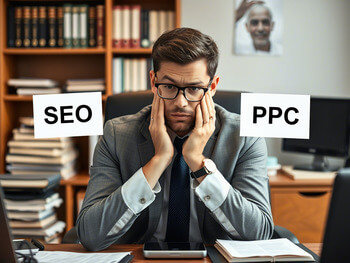SEO vs PPC for Law Firms: Where Should You Invest?
When it comes to digital marketing, few debates are as common or as crucial as SEO vs PPC. These two strategies offer distinct paths to attracting clients online: one focuses on long-term visibility through organic search, and the other delivers instant exposure through paid ads. For UK law firms navigating a competitive market, understanding how SEO and PPC work and where to invest can mean the difference between consistent lead generation and missed opportunities.
The truth is, there’s no universal answer. Your decision hinges on goals, budget, practice area competition, and timeframes. Let’s explore how each channel works, weigh their strengths and drawbacks, and help you determine the best fit for your firm or whether a hybrid strategy is the smarter play.
Contents
SEO: A Long-Term Strategy for Sustainable Client Acquisition
Search engine optimisation (SEO) is the art and science of earning visibility in search engines without paying for ad placement. It revolves around publishing useful content, refining the technical health of your website, and building backlinks that signal credibility to Google.
For law firms, SEO is often about showing up when potential clients are searching for help: “employment lawyer near me”, “how to dispute a will”, or “legal advice on tenancy agreements.”
Why SEO works for law firms
If you want to boost your firm’s visibility online, here’s how SEO can help:
1. It builds authority and trust
Organic rankings aren’t just cheaper. They’re more trusted. Users are far more likely to click on organic results than ads. Appearing at the top of Google without a “sponsored” tag sends a strong credibility signal.
2. No cost per click
Once your content ranks, it keeps generating traffic without ongoing spending. That makes SEO one of the most cost-efficient channels over the long run.
3. Results that compound
Every blog post, every backlink, and every optimisation adds to your site’s authority. It becomes easier to rank for new keywords over time, creating a snowball effect that strengthens your presence with less effort.
The trade-offs
As with all digital marketing strategies, SEO is not perfect. Here are some of its limitations:
1. It’s a slow burn
If your firm needs leads next week, SEO won’t help. Ranking well takes months, sometimes longer, especially in crowded fields such as personal injury or corporate law.
2. Google can be unpredictable
Algorithm changes can cause rankings to fluctuate. If your site isn’t built on solid technical and ethical SEO foundations, you could lose visibility overnight. Nevertheless, you can ask SEO experts, such as Kinetic Traffic, to ensure your website is always ready for future Google algorithm updates.
When SEO makes sense for law firms
SEO works best if any of the following situations apply to you:
- You’re building for long-term brand growth.
- Your firm is in a high-CPC niche where paid ads are expensive.
- You’re investing in content marketing to educate and attract potential clients.
- Your clients tend to research thoroughly before reaching out.
PPC: Fast Results for Immediate Lead Generation
On the other side of the SEO vs PPC debate is pay-per-click advertising. PPC, such as Google Ads or LinkedIn campaigns, is the fastest way to get your firm in front of prospective clients. You bid on specific search terms, and your ads appear at the top of search results or in targeted social feeds. As long as you’re paying, you’re visible. Stop spending, and your traffic disappears.
Why PPC appeals to law firms
Here’s how running a PPC campaign can benefit your legal practice:
1. Instant visibility
Campaigns can go live within days, making PPC perfect for generating quick results. Whether launching a new service or running a time-sensitive promotion, PPC puts you on the radar immediately.
2. Precision targeting
Target users by location, device, demographics, intent, and more. For firms focused on specific regions or legal issues, this level of targeting is invaluable.
3. Total measurability
Every click, conversion, and cost is tracked. You can test headlines, tweak landing pages, and fine-tune budgets with real-time data, offering a level of control SEO simply doesn’t provide.
The downside
Despite its strengths, PPC advertising has some disadvantages, too:
1. It’s expensive, especially for lawyers
Legal keywords are among the priciest in the UK. CPCs for terms like “family lawyer London” or “personal injury solicitor” can be eye-watering. Without careful optimisation, your return on investment may suffer.
2. It demands constant attention
Ads fatigue. Audiences change. Platforms update policies. Running PPC isn’t “set it and forget it”. It requires ongoing monitoring, testing, and refreshing to maintain performance. But the good news is you can always hire experts, such as our team at Kinetic Traffic, to run your PPC campaigns so you can focus on your clients and avoid overspending.
When PPC is the right choice
If any of the statements ring true for you, PPC can do wonders for your marketing campaign:
- You’ve just launched a new practice area and need exposure.
- You want to capitalise on seasonal demand or urgent legal trends.
- You’re competing in a crowded space and can’t wait for SEO to kick in.
- Your margins are strong enough to support a high ad spend.
SEO or PPC: What’s the Better Investment for Your Law Firm?
If your firm is launching a new office, rolling out a service, or needs fast leads, PPC is your best bet. It delivers quick visibility, helps validate offers, and gives you data to inform broader marketing efforts.
But if you’re aiming to reduce dependency on ad spending and grow sustainable traffic, SEO is the better long-term investment. It builds credibility, attracts high-intent clients, and continues to pay off long after the initial investment.
Here’s a quick cheat sheet:
|
Goal |
Better Option |
|
Immediate leads |
PPC |
|
Long-term brand authority |
SEO |
|
Low marketing budget |
SEO (over time) |
|
Launching a new service |
PPC |
|
Avoiding reliance on ad spend |
SEO |
|
Testing which messages convert |
PPC |
The Smartest Strategy? Do Both
So, what’s the verdict on the SEO vs PPC debate? For most law firms, it’s not SEO or PPC. Rather, it’s SEO and PPC. By combining both channels, you cover your bases:
- PPC provides instant leads while your SEO gains traction.
- SEO reduces long-term costs and delivers compounding traffic.
- PPC data informs SEO, showing which keywords and messages actually convert.
- SEO boosts your brand credibility, while PPC keeps you visible during ranking fluctuations.
- You can retarget SEO traffic with PPC ads, staying top-of-mind for visitors who didn’t convert the first time.
Think of PPC as the sprint and SEO as the marathon. Together, they create a balanced, resilient marketing strategy.
Combine Strategies for Better Results
If you’re a UK-based law firm trying to make sense of digital marketing, remember this: your choice between SEO and PPC isn’t binary. It’s about timing, budget, and goals. Use PPC to drive immediate results and test the waters. Invest in SEO to build long-term trust and visibility. When executed together, they don’t just coexist. They amplify each other.
At Kinetic Traffic, we specialise in helping UK law firms get significant results from both SEO and PPC. Whether you need fast leads through paid campaigns or want to build long-term organic visibility, we’ve got the expertise to craft a strategy that delivers. Get in touch today to see how we can help your legal practice grow smarter and faster.
Lead your law firm towards the best results.
Get in touch with our team and let’s talk about your marketing needs.







